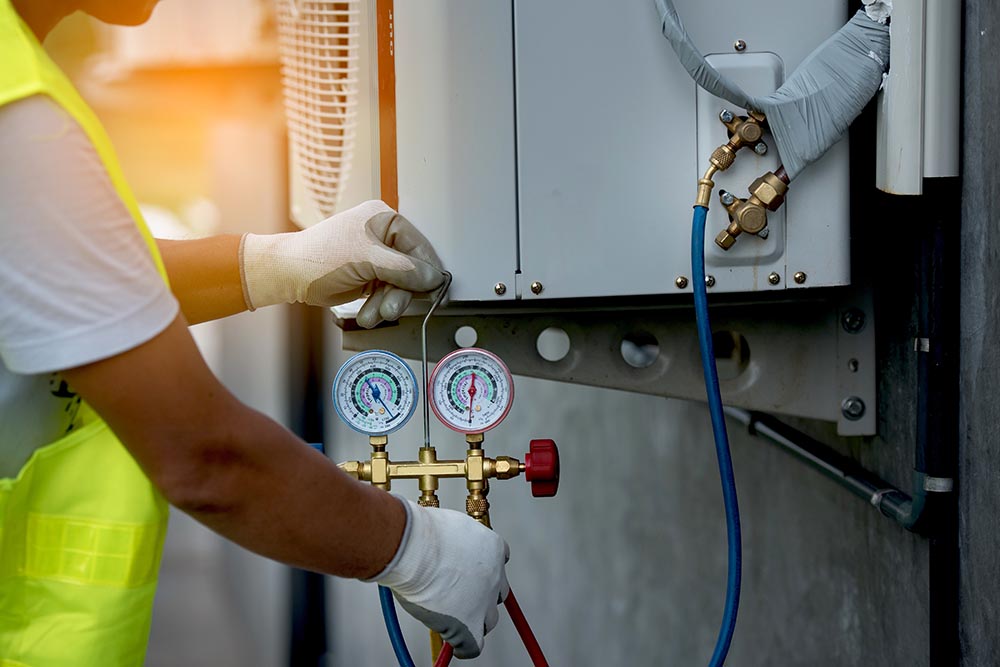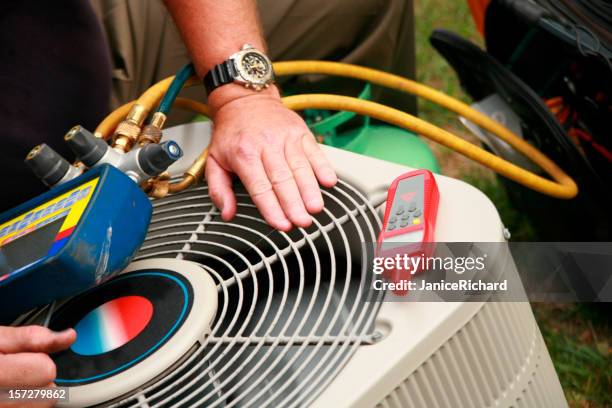Picking Between a Heatpump and Heater: Trick Considerations for Your Cooling And Heating Demands
When reviewing home heating choices for heating and cooling needs, the decision between a warm pump and a furnace can be intricate. Each system supplies unique advantages customized to certain climates and energy performance goals. Understanding these distinctions is crucial for making an enlightened option. Key variables such as setup costs and ecological effect further make complex the choice procedure. Which alternative truly lines up with one's comfort and sustainability choices? The complying with areas will certainly explore these factors to consider carefully.
Comprehending Warm Pumps: How They Work and Their Advantages
While numerous homeowners think about various heating alternatives, understanding just how heat pumps feature and their advantages can greatly influence their choice. Heat pumps run by moving heat instead of generating it. In the winter season, they remove warmth from the outside air or ground and move it indoors, while in the summer season, they reverse this process, cooling the home by eliminating heat outside. This double capability makes them versatile for year-round environment control.One of the primary benefits of heatpump is their energy performance. They use considerably less power contrasted to traditional home heating systems, potentially resulting in reduced utility bills (heat pump replacement ooltewah tn). Furthermore, heat pumps have a smaller carbon impact, making them an eco pleasant choice. They also require less upkeep than standard systems, adding to lasting expense financial savings. Overall, comprehending the auto mechanics and advantages of heatpump can help homeowners make informed decisions regarding their heating and cooling requirements
Checking Out Heating Systems: Types, Operation, and Benefits
Heaters can be found in different types, including gas, electrical, and oil models, each with distinct functional systems. Comprehending these distinctions is necessary, as they affect performance and home heating performance. Additionally, furnaces offer countless benefits, such as regular warm result and dependability in colder environments.
Sorts of Heaters
Furnace can vary significantly in design and operation, with heaters being a prominent choice amongst house owners. There are several kinds of heaters, each using different gas resources and innovations. Gas furnaces prevail, leveraging gas to create heat effectively. Electric heating systems, on the other hand, make use of electric resistance to create warmth, often preferred for their uncomplicated setup. Oil heating systems, while much less typical, are effective in areas with minimal gas gain access to (furnace replacement). Additionally, condensing heaters make the most of energy performance by capturing and recycling exhaust gases. Each kind runs via a system of warmth exchangers and ductwork to distribute warm air throughout a home. Recognizing the differences between these heating system kinds is crucial for educated heating and cooling choices
Advantages of Furnaces
For property owners looking for reputable heat during cold months, the benefits of furnaces are considerable. Heating systems provide constant home heating, making certain even temperatures throughout the home. They are especially reliable in severe cool, often outshining heatpump in icy conditions. Various types, including gas, electric, and oil heating systems, supply flexibility to satisfy diverse requirements and preferences.Furnaces likewise have a tendency to have lower first installment prices contrasted to warmth pumps, making them a more accessible alternative for many. Their robust design contributes to a longer life-span, with numerous systems lasting over 15 years with correct upkeep. Furthermore, modern furnaces are typically outfitted with advanced modern technology for enhanced performance, which can lead to minimized energy bills. In general, heating systems stay a reliable choice for effective home heating.

Energy Effectiveness: Contrasting Warm Pumps and Furnaces
When comparing energy effectiveness between warmth pumps and heating systems, the Seasonal Power Efficiency Ratio (SEER) plays an essential function in figuring out performance. In addition, an operational cost analysis exposes the long-lasting financial effects of each system. Understanding these elements can lead house owners in making educated choices about their home heating solutions.
Seasonal Energy Efficiency Ratio
Power performance plays an essential function in the decision-making procedure in between warmth pumps and heating systems, especially when taking into consideration the Seasonal Power Performance Proportion (SEER) This metric measures the cooling performance of heat pumps over a whole cooling season, supplying a standardized means to evaluate performance. Higher SEER rankings show greater energy efficiency, translating to lower energy intake and lowered energy costs. In comparison, heaters are commonly assessed using the Yearly Gas Use Efficiency (AFUE) ranking, which reflects heating performance. When comparing these 2 systems, house owners must prioritize SEER ratings for warmth pumps, as they straight impact total energy savings and ecological sustainability. A detailed understanding of SEER can notably influence the long-term contentment and cost-effectiveness of the chosen HVAC remedy.
Operational Price Evaluation
Recognizing the operational prices connected with heatpump and heaters is crucial for house owners examining their options. Heatpump normally provide greater energy performance, transforming electric power into warmth with very little waste. This causes lower monthly energy bills, specifically in moderate environments. On the other hand, traditional heating systems, particularly gas versions, may have lower upfront expenses yet can sustain higher functional expenses in time due to sustain rates and efficiency ratings.Moreover, heatpump can work as both home heating and cooling systems, potentially lowering the requirement for different HVAC units. While first financial investments for heat pumps might be higher, their long-term cost savings in power effectiveness can make them an extra affordable option for many families. Mindful evaluation of local power prices is important to identify the finest choice.
Installment Prices: What to Expect for Each Furnace
Setup prices for furnace can differ substantially between warm pumps and heating systems, affecting home owners' decisions. Heat pumps generally have higher in advance setup costs, usually varying from $3,500 to $8,000, depending on the device dimension and intricacy of installment. This consists of the outside device, interior handling system, and needed ductwork adjustments. Alternatively, furnaces often tend to have reduced first prices, balancing between $2,500 and $6,000, which can be appealing for budget-conscious property owners. Installment costs can enhance if extensive ductwork is required.Moreover, the choice of fuel kind for heating systems-- natural gas, lp, or electric-- can additionally affect installation costs. While heatpump provide energy efficiency, their first investment might hinder some purchasers. Ultimately, reviewing installment expenses along with long-lasting financial savings and effectiveness will certainly help house owners in making notified choices regarding their heater.
Climate Considerations: Which System Performs Better in Your Area
Just how do environment conditions influence the performance of heating unit? The efficiency of heatpump and furnaces can vary substantially depending upon the local environment. In modest climates, warmth pumps excel by successfully moving warm from the outside air, making them an energy-saving choice. Their efficiency reduces in exceptionally cold temperature levels, where they might struggle to draw out sufficient warmth. Alternatively, heaters, particularly gas versions, give trustworthy and consistent warmth no matter outside conditions, making them more effective in colder regions.In areas that experience milder wintertimes, warm pumps can run efficiently year-round, supplying both home heating and air conditioning. On the other hand, regions with severe wintertimes usually benefit from the robustness of furnaces. he has a good point Ultimately, recognizing the local climate is vital when deciding between a heatpump and a furnace, as it directly affects their operational performance and total performance.
Maintenance Demands: Long-Term Care for Warmth Pumps vs. Furnaces
While both warmth pumps and heaters need regular upkeep to guarantee peak efficiency, their specific requirements and care regimens differ considerably. Heating systems normally need much less frequent focus, with annual inspections sufficing to look for gas leaks, clean filters, and assess general capability. Their see here now simpler style typically allows for uncomplicated repairs.In contrast, heatpump necessitate semiannual maintenance due to their twin role in home heating and air conditioning. This includes cleansing coils, checking refrigerant levels, and guaranteeing that both the interior and outdoor systems operate at their best. Additionally, heatpump upkeep typically involves even more detailed components, making expert servicing essential.Neglecting maintenance can bring about diminished effectiveness and increased energy expenses for both systems. Eventually, house owners should think about these long-lasting treatment requirements when choosing between a warmth pump and a heater, as proactive upkeep can expand the lifespan and performance of either system significantly.
Environmental Influence: Choosing a Sustainable Heating Option
The ecological influence of heater is a critical assessment for house owners looking for sustainable options. Warm pumps are typically a lot more energy-efficient than traditional heating systems, as they move warm instead of create it, considerably minimizing carbon exhausts. By making use of renewable resource sources, such as geothermal or air-source heatpump, home owners can better minimize their eco-friendly footprint.On the other hand, all-natural gas heaters send out greenhouse gases and contribute to air contamination, though they often offer higher warm output. Innovations in innovation have led to the growth of high-efficiency heaters that minimize emissions.Ultimately, choosing a heating system entails weighing performance against ecological effect. Homeowners are encouraged to review regional energy sources and rewards for renewable systems, making certain an option that lines up with both personal convenience and ecological responsibility. The decision influences not only instant convenience however additionally long-term sustainability and ecological health and wellness.
Frequently Asked Concerns
For How Long Do Warm Pumps and Furnaces Generally Last?
The life-span of heat pumps generally varies from 15 to 20 years, get redirected here while heating systems can last between 15 to three decades. Regular maintenance substantially impacts their durability and efficiency in giving home heating services.
Can I Utilize a Warmth Pump in Exceptionally Cold Climates?
Heatpump can run in exceptionally cold climates, but their effectiveness lessens as temperature levels decline. In such conditions, supplemental home heating sources may be needed to keep comfy indoor temperatures and ensure peak performance.

What Is the Noise Level of Warmth Pumps Versus Furnaces?
The noise degrees of heatpump and heating systems vary significantly. Typically, heatpump operate even more quietly than traditional heaters, making them more effective for those conscious appear, while heating systems may generate louder operational noises throughout heating cycles.
Are Warm Pumps Suitable for Both Heating and Air conditioning?
Warm pumps are indeed ideal for both cooling and heating (heat pump replacement ooltewah tn). They function by moving warmth, supplying efficient temperature control year-round, making them a flexible option for home owners seeking an all-in-one cooling and heating solution
What Dimension Heater Do I Need for My Home?
Establishing the appropriate dimension heater for a home needs reviewing factors such as square footage, insulation high quality, regional climate, and the home's design. Consulting a specialist can ensure an exact assessment and optimal convenience. Heat pumps typically use greater power efficiency, transforming electrical power into heat with very little waste. In modest environments, warmth pumps stand out by successfully moving heat from the outside air, making them an energy-saving alternative. Alternatively, furnaces, especially gas versions, offer constant and dependable heat regardless of outdoor problems, making them preferable in colder regions.In areas that experience milder winters, heat pumps can operate efficiently year-round, supplying both heating and cooling. Heat pumps are typically much more energy-efficient than conventional heaters, as they transfer warmth instead than create it, significantly decreasing carbon emissions. By utilizing eco-friendly energy resources, such as air-source or geothermal warm pumps, property owners can better decrease their eco-friendly footprint.On the other hand, natural gas furnaces produce greenhouse gases and contribute to air contamination, though they usually give greater heat outcome.